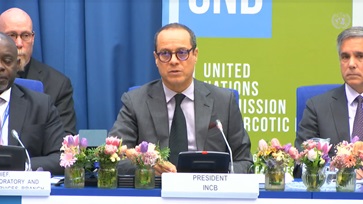Statement by Prof. Jallal Toufiq, President,
International Narcotics Control Board (INCB)
Sixty-seventh session of the Commission on Narcotic Drugs
Item 5 (b): Challenges and future work of the Commission on Narcotic Drugs, the World Health Organization and the International Narcotics Control Board in the review of substances for possible scheduling recommendations
18 March 2024, Vienna, Austria

Mr. Chair, Excellencies, Ladies and Gentlemen,
The past 10-15 years have seen a quantum leap in the level of sophistication of illicit drug manufacturing operations and the diversity of chemicals being found in illicit laboratories or intercepted on their way to such laboratories. Those developments far exceed anything that one could have envisaged at the time the 1988 Convention was negotiated.
As a result, the world precursor situation is now more complex than ever, characterized by the continuous emergence of alternatives to controlled precursors. These alternative chemicals include designer precursors, which are closely related chemicals with no known legitimate uses that are typically purpose-made to circumvent existing controls.
The Board's precursors reports provide ample evidence of these developments and their rapid pace. In addition, many of you have joined the Board's efforts over the past several years to identify practical and proven policy options to address the diversion of non-scheduled chemicals and the proliferation of designer precursors. These were subsequently compiled and published by the Board in early 2022 in the form of a guidance document for use by competent national authorities, law enforcement, judicial practitioners and other entities tasked with precursor control.
Commission resolution 65/3 of March of that same year was the next milestone in the international consensus-building process.
And last year, the Board initiated the process for the international scheduling of two series of closely related designer precursors of amphetamine-type stimulants, some of which have not yet been encountered in illicit markets. Over the past couple of months, you have discussed the Board's proposals, expressed alternative views, and sought clarifications from the Board, which we hope to have adequately addressed. Tomorrow, you will vote on the proposals.
Whatever the outcome of the vote, the discussions have been enriching and an important contribution to the international policy discussion related to contemporary precursor control as well as to the Commission's standing agenda item on the challenges and future work of CND, WHO and INCB in the review of substances for possible scheduling recommendations. I thank you for this discussion.
Looking forward, we can expect that the international precursors control landscape will continue to evolve, and that it will require proactive initiatives to keep pace with the transformation of illicit drug manufacture and to avoid situations in which traffickers easily circumvent controls simply by turning to closely related or substitute chemicals. And these concepts would have to be universally applied.
Having said that, scheduling in the Tables of the 1988 Convention remains the only internationally binding mechanism that can effectively interrupt, and prevent shifts in, global chemical supply chains.
I would like to conclude by thanking all of you on behalf of the Board for your valuable feedback to the scheduling questionnaires and the discussions of the past few months. The Board looks forward to continuing to work with you to address the diversion of non-scheduled chemicals and the proliferation of designer precursors, to ultimately safeguard health and wellbeing.
I thank you for your attention.
*****